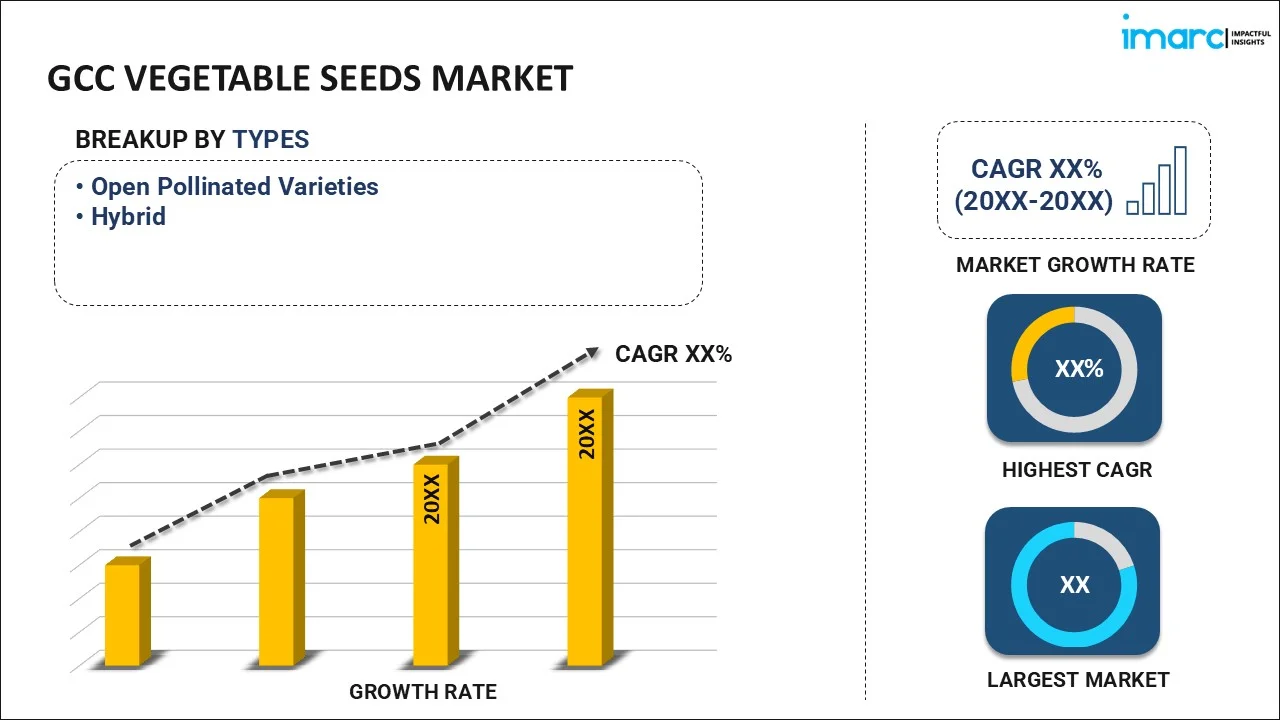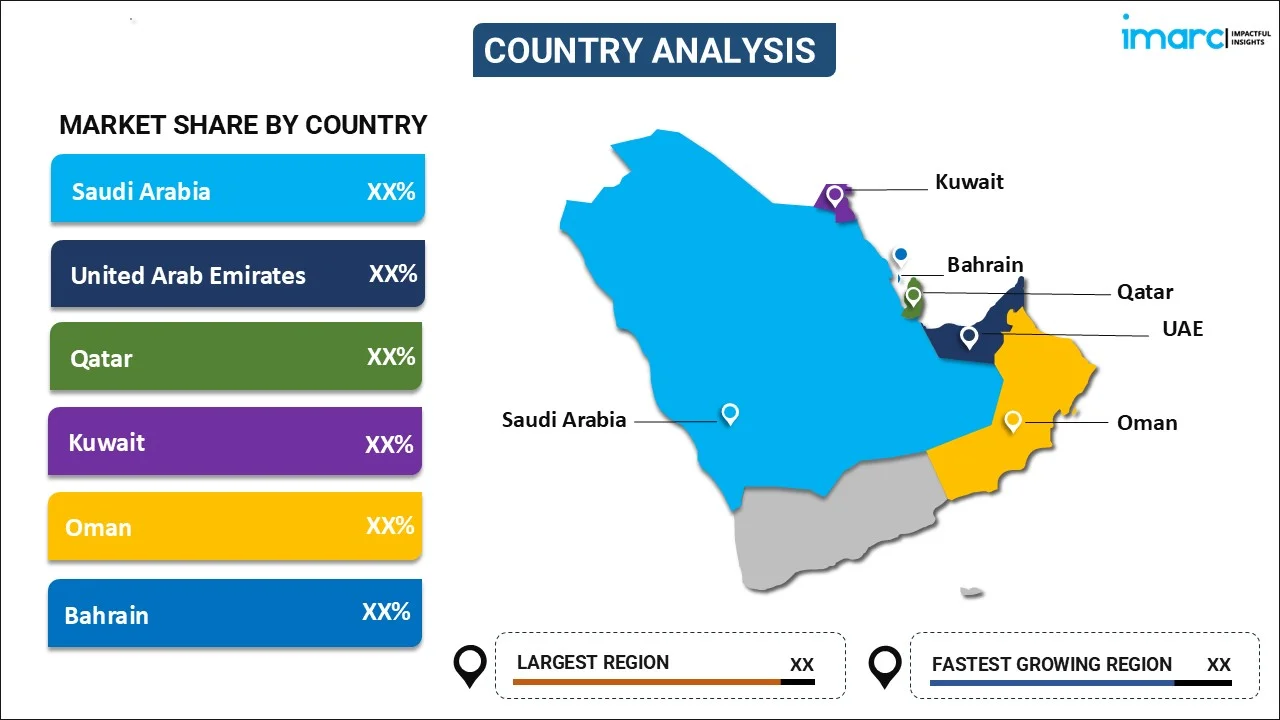
GCC Vegetable Seeds Market Report by Type (Open Pollinated Varieties, Hybrid), Crop Type (Solanaceae, Root and Bulb, Cucurbit, Brassica, Leafy, and Others), Cultivation Method (Protected, Open Field), Seed Type (Conventional, Genetically Modified Seeds), and Region 2025-2033
GCC Vegetable Seeds Market Overview:
The GCC vegetable seeds market size reached USD 156.2 Million in 2024. Looking forward, IMARC Group expects the market to reach USD 266.2 Million by 2033, exhibiting a growth rate (CAGR) of 5.61% during 2025-2033. The market is primarily driven by the growing consumer demand for organic produce, the increasing use of precision agriculture technologies, favorable government incentives supporting sustainable farming practices, the rising popularity of organic farming, and the expanding need for hybrid seeds that offer resilience and higher yields.
|
Report Attribute
|
Key Statistics
|
|---|---|
|
Base Year
|
2024
|
|
Forecast Years
|
2025-2033
|
|
Historical Years
|
2019-2024
|
| Market Size in 2024 | USD 156.2 Million |
| Market Forecast in 2033 | USD 266.2 Million |
| Market Growth Rate 2025-2033 | 5.61% |
GCC Vegetable Seeds Market Trends:
Rising Demand for Hybrid Seeds
The growing demand for hybrid vegetable seeds in the Gulf Cooperation Council (GCC) is driven by farmers seeking solutions to the region's challenging climate and limited water resources. Hybrid seeds offer higher yields, better disease resistance, and greater resilience, making them ideal for the GCC's arid conditions. Particularly appealing to farmers is their capacity to grow on less water while still yielding high-quality crops, which enhances output and profits. These seeds are becoming even more popular since they also satisfy the rising quality requirements of both domestic and international markets. Additionally, hybrid seeds are promoted by regional governments as a way to increase food security and lessen dependency on imported vegetables. This tendency is being supported by continued research into creating seed variants specific to local climates, which makes hybrid seeds an increasingly essential part of the GCC’s agricultural landscape.
Growing Adoption of Precision Agriculture
The rising adoption of precision agriculture in the GCC is transforming vegetable cultivation, as farmers increasingly utilize advanced technologies like sensors, drones, and GPS-guided machinery. With the use of these instruments, farmers can precisely monitor crop health, soil conditions, and water requirements, enabling them to make well-informed decisions that will increase yield and cut expenses. Precision agriculture is particularly useful in an area with limited water resources and an arid climate since it maximizes production while using less water. Government programs targeted at enhancing agriculture's sustainability provide as further fuel for this trend by supporting contemporary, effective farming techniques. Higher yields and better crop quality are expected to strengthen the vegetable seeds industry in the GCC as more farmers use precision technologies.
Expansion of Organic Farming Practices
In the GCC, demand for organic vegetable seeds is increased by growing adoption of organic farming practices. The willingness to pay for organic vegetables is rooted in consumer acceptance of the health advantages of organic produce and concerns regarding environmental impacts associated with conventional farming. This has led to increasing demand for seeds that are not reliant on synthetic pesticides, fertilizers, and genetically modified organisms (GMO). Sustainable farming is largely driven by consumer demand and favorable government incentives. Additionally, increasing awareness about food safety and quality assurance in the region is expected to augment the demand for certified organic seeds in the rise of the organic farming vegetable seeds market. The shift toward organic farming in the GCC is further supported by government initiatives promoting sustainable agriculture, offering subsidies and support for organic practices. As a result, local farmers are increasingly investing in organic vegetable seed varieties to meet this growing market demand.
GCC Vegetable Seeds Market Segmentation:
IMARC Group provides an analysis of the key trends in each segment of the market, along with forecasts at the country level for 2025-2033. Our report has categorized the market based on type, crop type, cultivation method, and seed type.
Type Insights:

- Open Pollinated Varieties
- Hybrid
The report has provided a detailed breakup and analysis of the market based on the type. This includes open pollinated varieties and hybrid.
Crop Type Insights:
- Solanaceae
- Root and Bulb
- Cucurbit
- Brassica
- Leafy
- Others
A detailed breakup and analysis of the market based on the crop type have also been provided in the report. This includes solanaceae, root and bulb, cucurbit, brassica, leafy, and others.
Cultivation Method Insights:
- Protected
- Open Field
The report has provided a detailed breakup and analysis of the market based on the cultivation method. This includes protected and open field.
Seed Type Insights:
- Conventional
- Genetically Modified Seeds
A detailed breakup and analysis of the market based on the seed type have also been provided in the report. This includes conventional and genetically modified seeds.
Country Insights:

- UAE
- Saudi Arabia
- Kuwait
- Qatar
- Oman
- Bahrain
The report has also provided a comprehensive analysis of all the major regional markets, which include UAE, Saudi Arabia, Kuwait, Qatar, Oman, and Bahrain.
Competitive Landscape:
The market research report has also provided a comprehensive analysis of the competitive landscape. Competitive analysis such as market structure, key player positioning, top winning strategies, competitive dashboard, and company evaluation quadrant has been covered in the report. Also, detailed profiles of all major companies have been provided.
GCC Vegetable Seeds Market Report Coverage:
| Report Features | Details |
|---|---|
| Base Year of the Analysis | 2024 |
| Historical Period | 2019-2024 |
| Forecast Period | 2025-2033 |
| Units | Million USD |
| Scope of the Report | Exploration of Historical Trends and Market Outlook, Industry Catalysts and Challenges, Segment-Wise Historical and Future Market Assessment:
|
| Types Covered | Open Pollinated Varieties, Hybrid |
| Crop Types Covered | Solanaceae, Root and Bulb, Cucurbit, Brassica, Leafy, Others |
| Cultivation Methods Covered | Protected, Open Field |
| Seed Types Covered | Conventional, Genetically Modified Seeds |
| Countries Covered | UAE, Saudi Arabia, Kuwait, Qatar, Oman, Bahrain |
| Customization Scope | 10% Free Customization |
| Post-Sale Analyst Support | 10-12 Weeks |
| Delivery Format | PDF and Excel through Email (We can also provide the editable version of the report in PPT/Word format on special request) |
Key Questions Answered in This Report:
- How has the GCC vegetable seeds market performed so far and how will it perform in the coming years?
- What has been the impact of COVID-19 on the GCC vegetable seeds market?
- What is the breakup of the GCC vegetable seeds market on the basis of type?
- What is the breakup of the GCC vegetable seeds market on the basis of crop type?
- What is the breakup of the GCC vegetable seeds market on the basis of cultivation method?
- What is the breakup of the GCC vegetable seeds market on the basis of seed type?
- What are the various stages in the value chain of the GCC vegetable seeds market?
- What are the key driving factors and challenges in the GCC vegetable seeds?
- What is the structure of the GCC vegetable seeds market and who are the key players?
- What is the degree of competition in the GCC vegetable seeds market?
Key Benefits for Stakeholders:
- IMARC’s industry report offers a comprehensive quantitative analysis of various market segments, historical and current market trends, market forecasts, and dynamics of the GCC vegetable seeds market from 2019-2033.
- The research report provides the latest information on the market drivers, challenges, and opportunities in the GCC vegetable seeds market.
- Porter's five forces analysis assist stakeholders in assessing the impact of new entrants, competitive rivalry, supplier power, buyer power, and the threat of substitution. It helps stakeholders to analyze the level of competition within the GCC vegetable seeds industry and its attractiveness.
- Competitive landscape allows stakeholders to understand their competitive environment and provides an insight into the current positions of key players in the market.
Need more help?
- Speak to our experienced analysts for insights on the current market scenarios.
- Include additional segments and countries to customize the report as per your requirement.
- Gain an unparalleled competitive advantage in your domain by understanding how to utilize the report and positively impacting your operations and revenue.
- For further assistance, please connect with our analysts.
 Request Customization
Request Customization
 Speak to an Analyst
Speak to an Analyst
 Request Brochure
Request Brochure
 Inquire Before Buying
Inquire Before Buying




.webp)




.webp)












